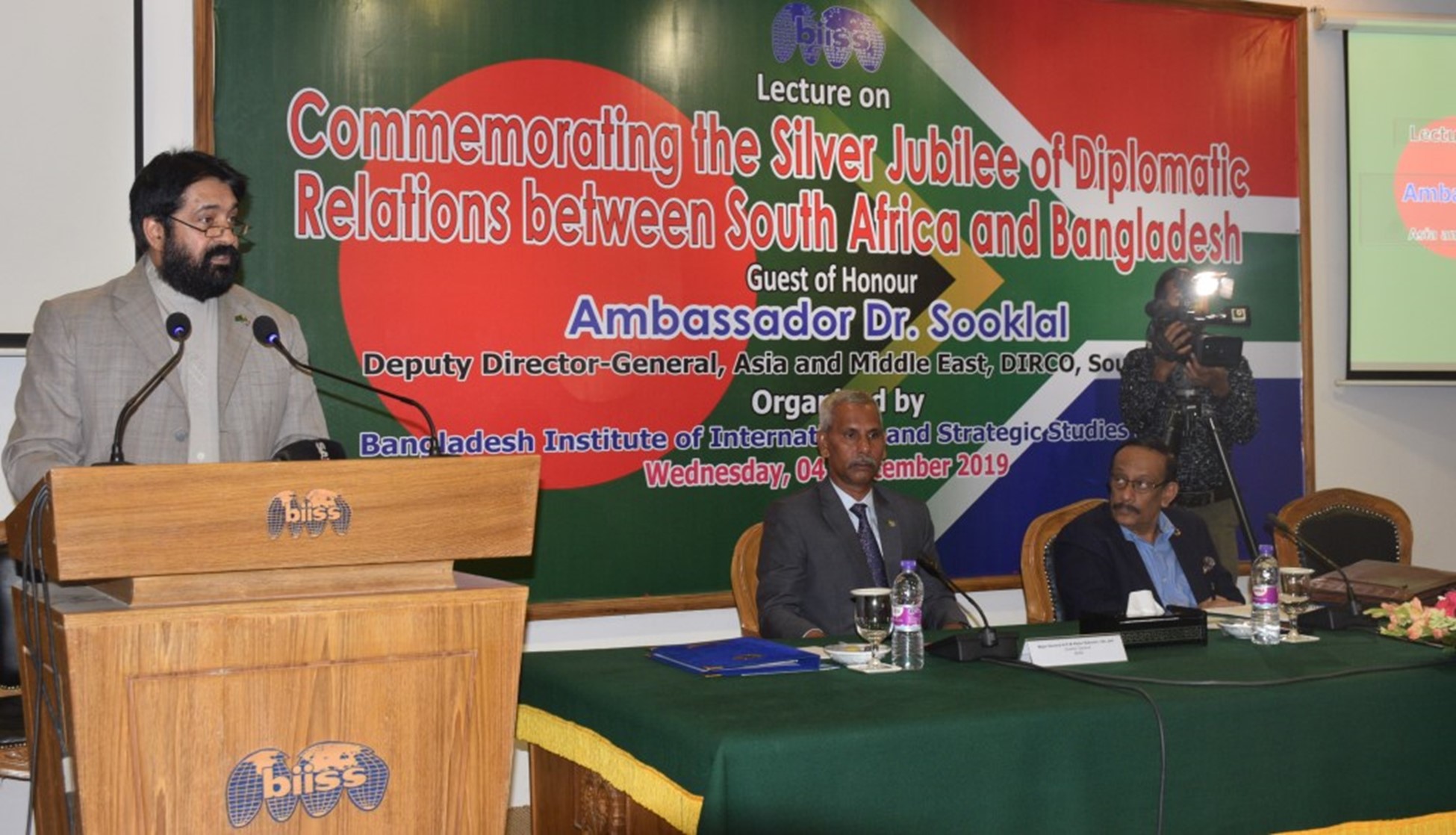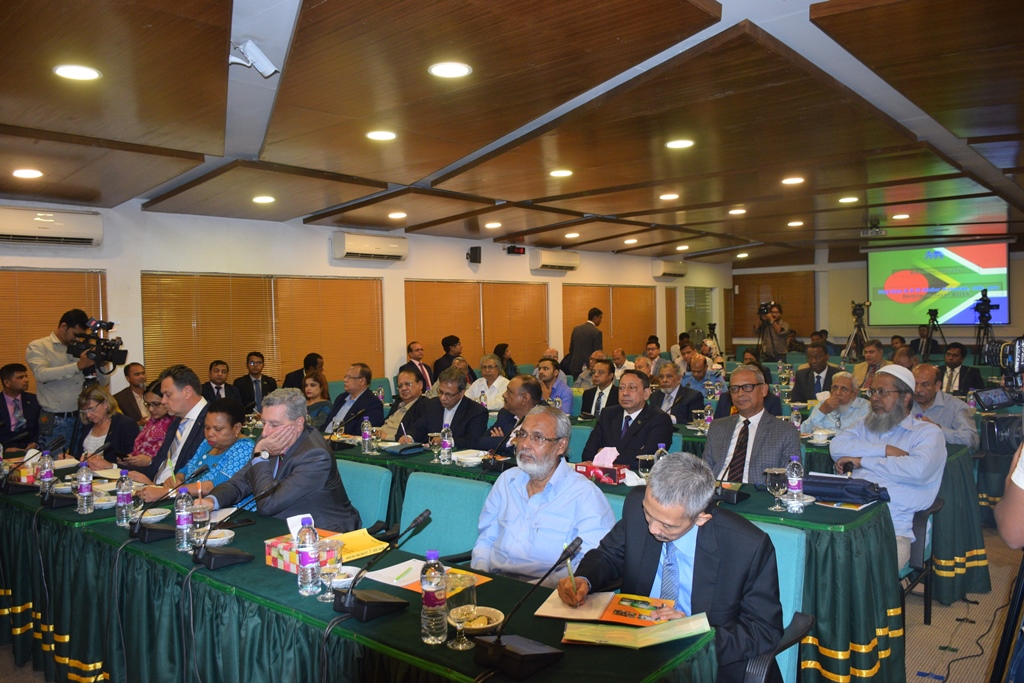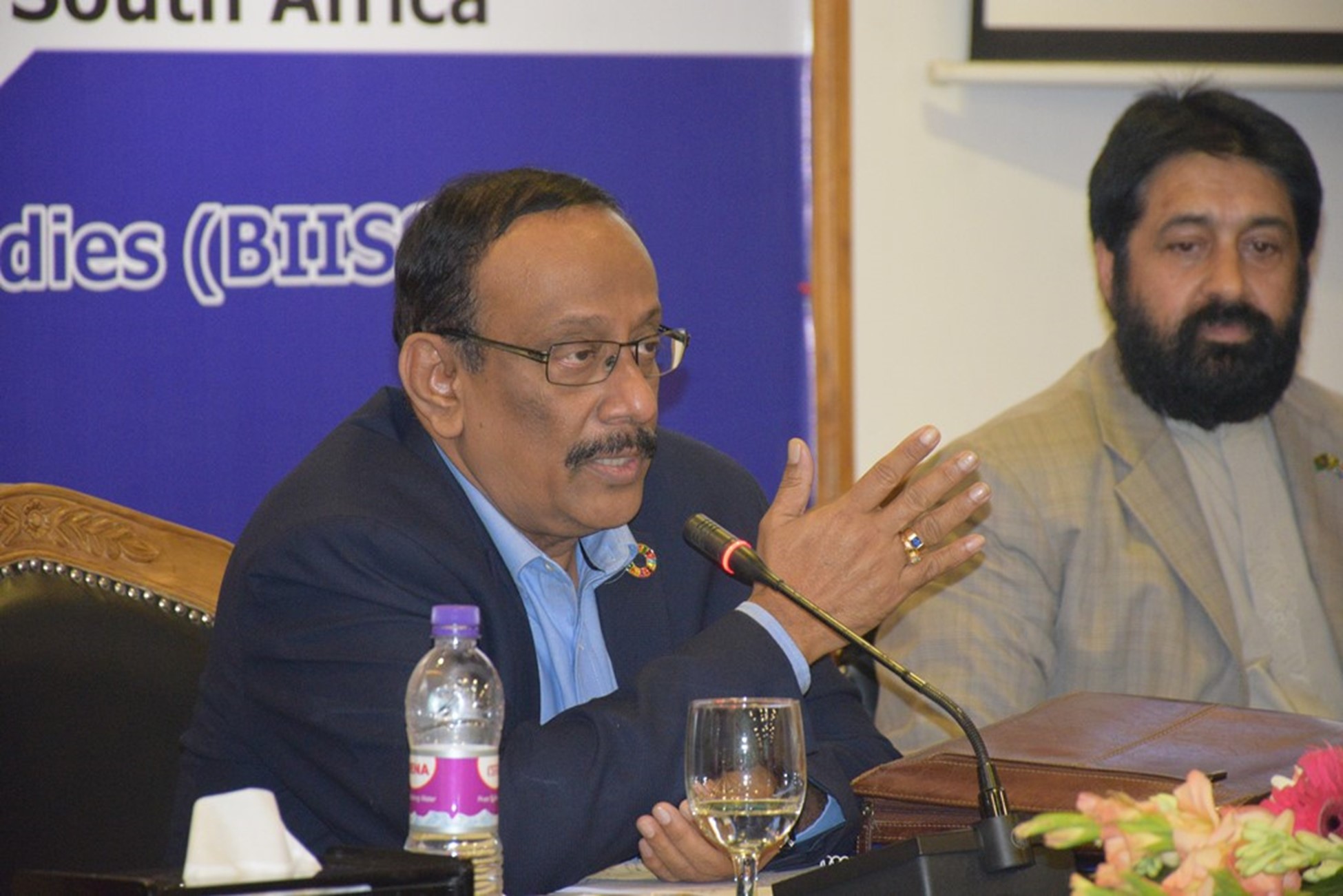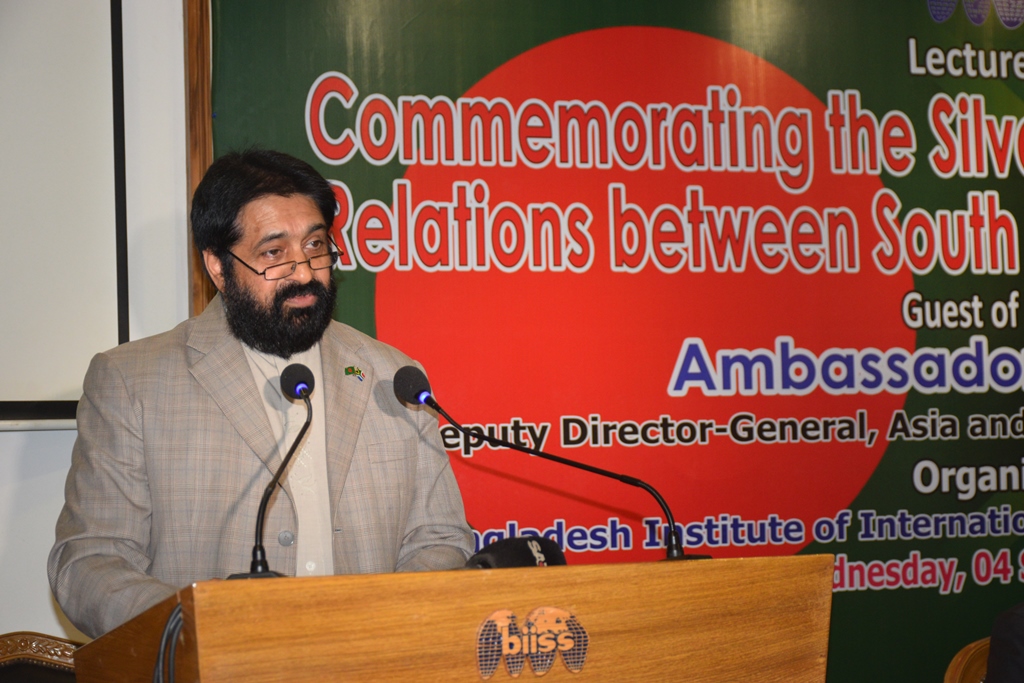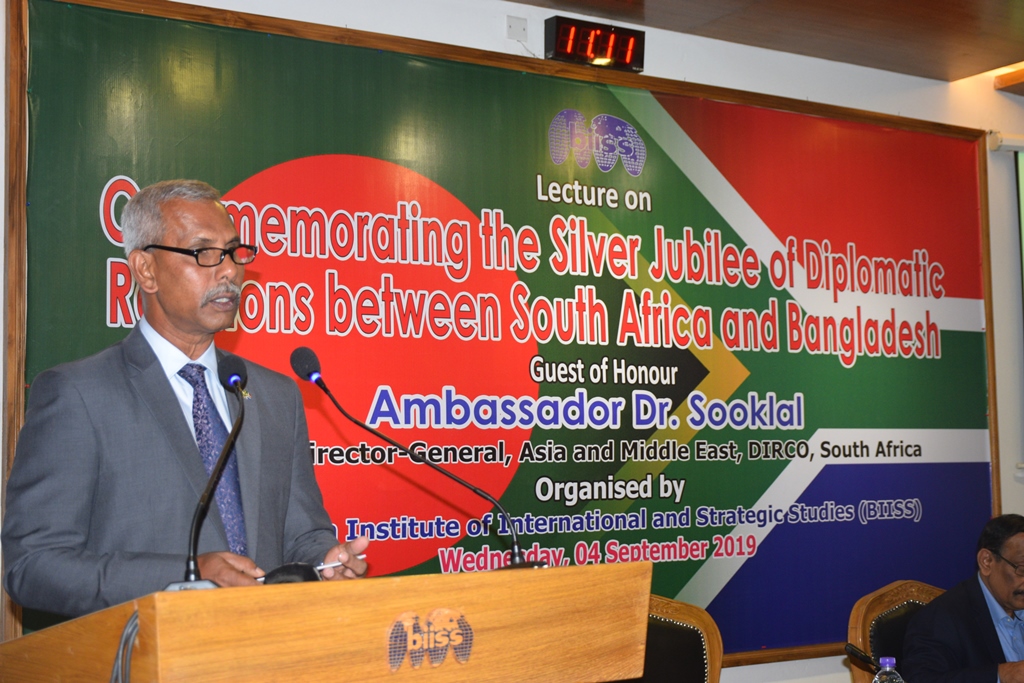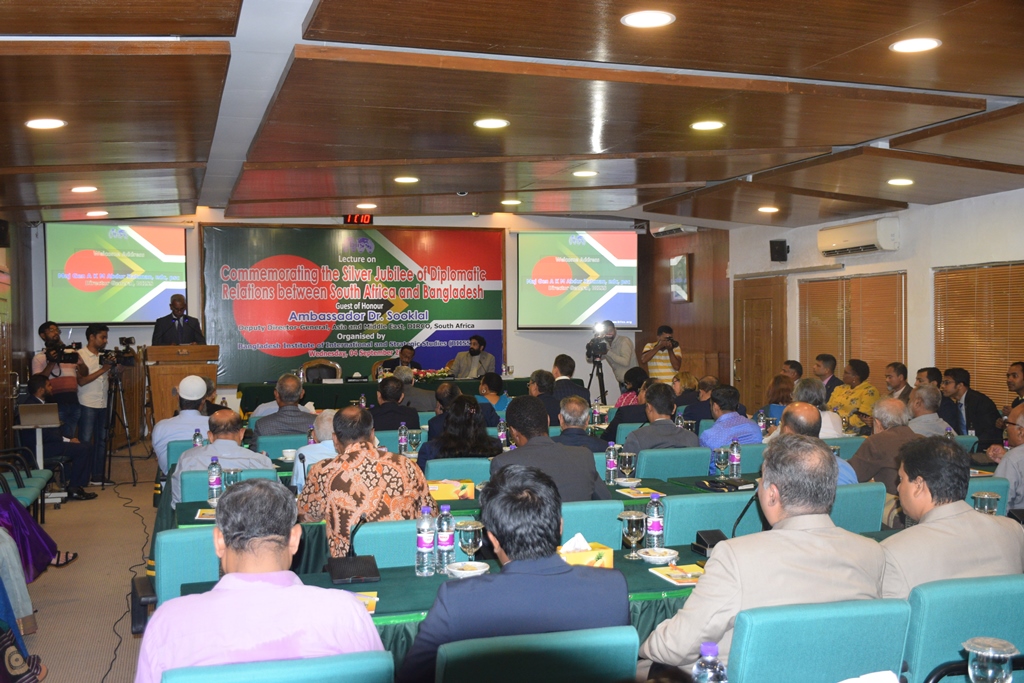Lecture on Commemorating the Silver Jubilee of Diplomatic Relations between South Africa and Bangladesh on 04 September 2019
DATE: 2019-09-04
Bangladesh Institute of International and Strategic Studies (BIISS) organised a lecture in its Eminent Persons Lecture Series (EPLS) titled “Commemorating the Silver Jubilee of Diplomatic Relations between South Africa and Bangladesh”, on 04 September 2019. His Excellency Ambassador Dr. Anil Sooklal, Deputy Director General, Asia and Middle East, Department of International Relations and Cooperation (DIRCO), South Africa, graced the occasion as the guest speaker. Major General AKM Abdur Rahman, ndc, psc, Director General, BIISS commenced the session with his address of welcome. Mr. Md. Shahidul Haque, Foreign Secretary, Government of Bangladesh, chaired and concluded the session
General Rahman began with speaking about the silver jubilee celebration of Bangladesh-South Africa diplomatic ties. The countries are deeply appreciative of each other’s ideals of freedom struggle and hold sincere respect for their two greatest leaders: Bangabandhu Sheikh Mujibur Rahman and Nelson Mandela. He gratefully referred to President Mandela’s visit to Bangladesh in March, 1997. The focal points in Bangladesh-South Africa bilateral relations are to enhance these bonds through solidarity, friendship, and promote south-south cooperation for implementing the 2030 Agenda. Both countries are members of some common organizations, e.g., Indian Ocean Rim Association (IORA), the Commonwealth, Non-aligned Movement (NAM) etc. South Africa is a member of the BRICS group. Bangladesh has huge investment opportunities in diverse sectors including readymade garments, pharmaceuticals, fisheries, leather products, tourism etc, as it is moving fast towards becoming a developed country by 2041. Here, General Rahman emphasized on working more closely together in identified priority areas that will benefit both countries, especially in changing global and regional dynamics. He concluded by stressing greater cooperation in cricket as Bangladesh’s cricket coaches were mostly South African.
Ambassador Dr. Anil Sooklal, conveyed South Africa’s gratitude to Bangladesh and the Bangladeshi people for contributing to South Africa’s fight for freedom, liberation and democracy. He recalled President Mandela’s visit to Bangladesh with pride, paid homage to the dynamic and visionary leadership of Mandela and Bangabandhu. Bangladesh and South Africa have remarkable prospects given the close relation they enjoy and cooperation they have in different sectors, e.g., trade and investment, sports, wildlife management etc. On racial tensions in his own country, he said the legacy of apartheid would need more time to go away. He recognized Bangladesh’s contribution as one of the largest troop and police contributors to United Nations peacekeeping operations, and the current participation in six missions in Africa. He placed focus on the Indo-Pacific region for bolstering cooperation among members amid the changing global economic, security and geopolitical scenarios.
Dr. Sooklal also spoke on the worldwide economic slump and ensuing problems, rise and spread of racial supremacist/ jingoistic movements in several countries, trade protectionism, withdrawal by the US from many international fora and trade war with China and its impacts, which were gravely endangering the present-day multilateralism-based global structure. He concluded the speech by re-emphasizing his country’s commitment to further deepening the bonds of friendship that exist with Bangladesh.
Mr. Md. Shahidul Haque, Foreign Secretary, Bangladesh, in his closing remarks, thanked the ambassador for mentioning South Africa as a source of inspiration during Bangladesh’s freedom struggle in 1971. He also talked about the visit of President Mandela to Bangladesh and his own involvement during that event. Bangladesh and South Africa are working closely in various organizations, but Bangladesh’s links with Africa are rather very lean; when this realized some years ago, Bangladesh initiated to increase its presence in Africa. The goal was not only to raise diplomatic or business visits but also connecting people and setting up mission there. Consequently, two missions were set up this year. He further said that in the past, a major war was followed by restructuring of the global order but at present, economic and geopolitical changes were occurring even in the absence of any major war, putting multilateralism at stake from diverse perspectives. Thus, developing countries like Bangladesh and South Africa must keep up their efforts for a fair and justice based society where people could get their equitable share of wealth. On redistribution of wealth, he said Bangladesh attained impressive economic growth in last 10 years but that also brought social inequalities. Distribution of wealth in an economy has always been a debated issu and could easily be resolved. But the question was how far it could be brought to a certain level where people would not be hurt. He said Bangladesh was deepening and widening its relations with not only South Africa but the whole African continent. As some of Bangladesh’s traditional partners were slowing down in terms of their economic and political activities, there would be a need to be together for creating a better world for countries in these two regions. He concluded by thanking H.E. Sotyu for her courage for coming out and saying things that had to be said.

